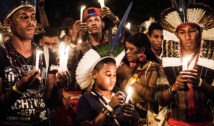
U.S. Federal Watchdog Decries Violations of Religious Liberty in Russia and Russian-Occupied Ukraine
- By Geoffrey Peters --
- 24 Jul 2023 --
Religious liberty in Russia and in the occupied regions of Ukraine have been steadily and systematically eroded since the Kremlin’s invasion in 2022, reaching a condition worse than ever before, according to two new reports by the United States Commission on International Religious Freedom (USCIRF).
Over time, the Russian government has conferred special recognition and privileges upon the Russian Orthodox Church of the Moscow Patriarchate, which has resulted in an environment hostile to other religious groups, notes USCIRF, an independent and bipartisan nine-member federal body that monitors and reports on freedom of religion or belief overseas and makes policy recommendations to the U.S. president, Secretary of State and Congress.
In its first report, “Religious Freedom Conditions in the Russian Federation,” the watchdog points out that Moscow considers independent religious groups to be “disloyal to the state and a threat to political stability.”
The six-page report outlines how existing laws against proselytization and extremism have been enforced with increasing severity, leading to continued persecution of various religious communities, notably including Jehovah’s Witnesses, Scientologists, and Allya Ayat, a Kazakh esoteric movement.
The report highlights rulings by the European Court of Human Rights’ (ECHR), which condemn Russia’s treatment of Jehovah’s Witnesses and Allya Ayat. Despite the rulings, the report points out, Russia chose to withdraw from the ECHR system and disregards its decisions.
USCIRF also reports that in 2015, Russia enacted legislation empowering the Justice Ministry to designate foreign organizations perceived as a threat to national security as “undesirable.” The “undesirable” classification prohibits the organization from conducting operations within the country or disseminating information, and it poses a risk of imprisonment and fines for individuals associated with the organization, including those who communicate with it or engage with its social media posts.
The report details that following Russia’s 2022 invasion of Ukraine, there was a notable increase in the number of religious organizations labeled as “undesirable” rather than “extremist.”
Among those so designation were several evangelical churches. Additionally, amendments were introduced to criminalize any involvement in the activities of such an “undesirable” organization.
According to the second report, “Russia’s Religious Freedom Violations in Ukraine,” since the Kremlin’s full-scale invasion on February 24, 2022, religious life has been dismantled and religious diversity stifled in various regions of the country because of the actions of the Russian military.
“On the frontlines of the war, Russian artillery and military forces frequently damaged and destroyed religious buildings and other sites and killed or injured those sheltering or worshiping in these places,” says the seven-page report.
The report also raises the alarm that in regions under Russian control, de-facto authorities have engaged in abduction and torture of religious leaders. Authorities have implemented the repressive legal measures that were previously established in occupied territories of Crimea and Donbas.
“Russia continues to be the most significant threat to religious freedom in Ukraine,” concludes the report, and recommends that the State Department continue its designation of the Russian Federation as a “country of particular concern” for engaging in “systematic, ongoing, and egregious violations of religious freedom.”



















